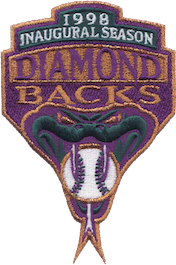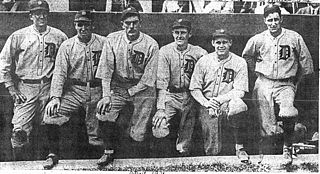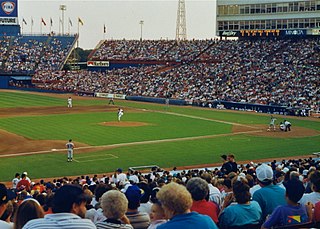Related Research Articles
The 1968 World Series was the championship series of Major League Baseball's (MLB) 1968 season. The 65th edition of the World Series, it was a best-of-seven playoff between the American League (AL) champion Detroit Tigers and the National League (NL) champion St. Louis Cardinals. The Tigers won in seven games for their first championship since 1945, and the third in their history.

The 1998 Arizona Diamondbacks season was the Diamondbacks' inaugural season. They looked to contend in what was a strong National League West. They finished the season 33 games behind the National League Champion San Diego Padres with a record of 65–97, last in the division.

The 1991 Baltimore Orioles season was a season in American baseball. It involved the Orioles finishing sixth in the American League East with a record of 67 wins and 95 losses. Cal Ripken. Jr. would be the first shortstop in the history of the American League to win two MVP awards in a career. This was also the Orioles' last year at Memorial Stadium, as they would move into Oriole Park at Camden Yards the following year.
The 1988 Baltimore Orioles had the worst start to a season in modern American baseball history. The Orioles finished seventh in the American League East, reduced to a record of 54 wins and 107 losses just five seasons after winning the World Series. The season is most notable for the 0–21 start that lasted from April 4th to April 28th. Manager Cal Ripken, Sr. was fired after an 0–6 start and replaced by Hall of Famer Frank Robinson. The Orioles won their first game of the year against the Chicago White Sox at Comiskey Park on April 29. The most runs allowed during the season was 15 in a game on June 19 while the most runs scored was 12 in a game on May 31. Orioles owner Edward Bennett Williams died in August of that year.
The Oakland Athletics' 1988 season involved the A's winning their first American League West title since 1981, with a record of 104 wins and 58 losses. In 1988, the elephant was restored as the symbol of the Athletics and currently adorns the left sleeve of home and road uniforms. The elephant was retired as team mascot in 1963 by then-owner Charles O. Finley in favor of a Missouri mule. The A's defeated the Boston Red Sox in the ALCS, but lost the World Series to the Los Angeles Dodgers in five games, including a dramatic, classic walk-off home run by the Dodgers' Kirk Gibson in game one.
The 1987 Detroit Tigers season saw the Tigers make a startling late-season comeback to win the American League East on the season's final day. The Tigers finished with a Major League-best record of 98–64, two games ahead of the Toronto Blue Jays. Detroit lost the ALCS to the Minnesota Twins in 5 games.
The 1984 Detroit Tigers won the 1984 World Series, defeating the San Diego Padres, 4 games to 1. The season was their 84th since they entered the American League in 1901.
The 1961 Detroit Tigers won 101 games but finished in second place, eight games behind the Yankees. The team's 1961 record tied the 1934 Tigers team record of 101 wins, and only twice in team history have the Tigers won more games: 1968 and 1984.

The 1921 Detroit Tigers finished in sixth place in the American League, 27 games behind the Yankees, with a record of 71–82. Despite their sixth-place finish, the 1921 Tigers amassed 1,724 hits and a team batting average of .316—the highest team hit total and batting average in American League history. Detroit outfielders Harry Heilmann and Ty Cobb finished No. 1 and No. 2 in the American League batting race with batting averages of .394 and .389, and all three Detroit outfielders ranked among the league leaders in batting average and RBIs. As early proof of the baseball adage that "Good Pitching Beats Good Hitting", the downfall of the 1921 Tigers was the absence of good pitching. The team ERA was 4.40, they allowed nine or more runs 28 times, and only one pitcher had an ERA below 4.24.
The 1975 Detroit Tigers compiled a record of 57–102, the fifth worst season in Detroit Tigers history. They finished in last place in the American League East, 37½ games behind the Boston Red Sox. Their team batting average of .249 and team ERA of 4.27 were the second worst in the American League. They were outscored by their opponents 786 to 570.
The 1975 Montreal Expos season was the seventh season in the history of the franchise. The Expos finished in last place in the National League East with a record of 75–87, 17½ games behind the Pittsburgh Pirates.
The 1972 Detroit Tigers won the American League East championship with a record of 86–70 (.551), finishing one-half game ahead of the Boston Red Sox. They played one more game than the Red Sox due to a scheduling quirk caused by the 1972 Major League Baseball strike—a game which turned out to allow them to win the division. They lost the 1972 American League Championship Series to the Oakland A's three games to two.
The 1996 Detroit Tigers had a record of 53–109 for what was, at the time, the most losses (109) and worst winning percentage (.327) in team history—both of which have since been surpassed twice by the 2003 and 2019 teams.
The 1987 Atlanta Braves season was the 117th in franchise history and their 22nd in Atlanta. The team introduced new uniforms this season harkening back to the 1950s, which, with a slight change made in 2019, continue to be the team's uniforms to this day, replacing their pullover jersey/beltless pants combo worn since 1980.
The 1991 Detroit Tigers finished in a tie for second place in the American League East with a record of 84–78 (.519). They outscored their opponents 817 to 794. The Tigers drew 1,641,661 fans to Tiger Stadium in 1991, ranking 12th of the 14 teams in the American League.
The Tigers entered the season as the reigning World Series champions. The 1985 Detroit Tigers finished in third place in the American League East with a record of 84–77 (.522), 15 games behind the Blue Jays. The Tigers outscored their opponents 729 to 688. The Tigers drew 2,286,609 fans to Tiger Stadium in 1983, ranking 3rd of the 14 teams in the American League.

The Detroit Tigers' 1992 season was a season in American baseball. It involved the Detroit Tigers attempting to win the American League East.
The Detroit Tigers' 1994 season had a record of 53–62 in a strike-shortened season. The season ended with the Tigers in fifth place in the newly formed American League East. The season featured the return of former star Kirk Gibson, the return of Ernie Harwell to the television broadcast booth and the 18th season of the Alan Trammell and Lou Whitaker double play combination.
The 1995 Detroit Tigers finished in fourth place in the American League East with a record of 60–84 (.417). The strike-shortened 1995 season was the last for Hall of Fame manager Sparky Anderson and longtime second baseman Lou Whitaker, who each retired at the end of the season, as well as Kirk Gibson who retired in August 1995.
The 2002 Cleveland Indians season was the 102nd season for the franchise. The 2002 Major League Baseball season began on March 31, 2002.The team finished third in the American League Central behind the Minnesota Twins and the Chicago White Sox.
References
- 1993 Detroit Tigers season at Baseball Reference
- Tigers at Baseball Almanac